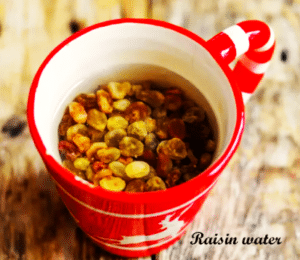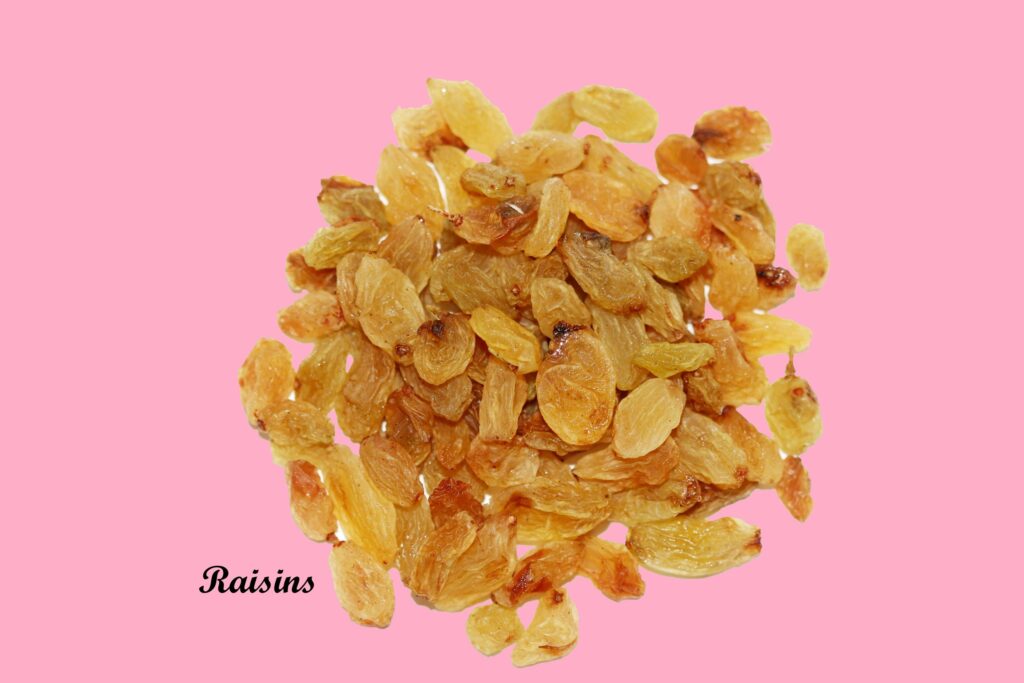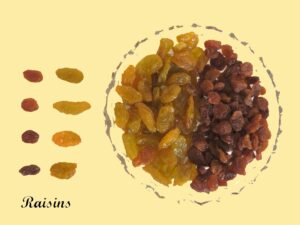Introduction of Raisin Water:
If you make a purchase after clicking on one of our links, we may get a small commission.
Raisin water, also known as “kishmish ka pani”, is gaining popularity as a simple, nutritious drink with a variety of health benefits. By soaking raisins in water overnight, the nutrients in the raisins are released into the water, creating a refreshing drink with a distinct flavor. Though often promoted in wellness circles for its detoxifying and digestive benefits, it is important to examine the nutritional value, scientifically supported benefits, and potential drawbacks of raisin water.
In this article, we will dive into the properties of raisin water, how to prepare it, and the various potential health effects, separating fact from fiction.

What is Raisin Water?
Raisin water is created by soaking raisins in water overnight and straining the mixture the following morning. While the water absorbs many nutrients from the raisins during this process, the texture and taste of the raisins also change slightly, becoming softer and more plump.
Raisins, which are essentially dried grapes, are packed with fiber, antioxidants, vitamins, and minerals like potassium and magnesium. Raisin water is said to be an easy way to extract these nutrients and make them more readily available to the body. Some enthusiasts claim that this concoction can offer benefits for digestion, detoxification, energy, and skin health.
Nutritional Profile of Raisins
Raisins are nutrient-dense and packed with essential vitamins and minerals. A portion of the key supplements found in raisins include:
- Dietary Fiber: Raisins are rich in fiber, which is essential for maintaining healthy digestion.
- Antioxidants: Raisins contain phenolic compounds and flavonoids, both of which are powerful antioxidants that help reduce oxidative stress in the body.
- Vitamins: They are a good source of B vitamins, which help boost energy and support brain function.
- Minerals: Raisins are high in minerals like potassium, calcium, and iron. These minerals are essential for maintaining healthy blood pressure, bone health, and preventing anemia.
Health Benefits of Raisin Water
- Aids in Digestion
One of the most commonly touted benefits of raisin water is its ability to support digestion. The high fiber content of raisins can help to keep the digestive tract functioning smoothly. When soaked in water, the soluble fiber in raisins becomes more easily digestible, aiding in the absorption of nutrients from food and relieving issues like constipation or indigestion.
- Detoxification
Raisin water is often promoted as a natural detoxifier. It is believed that drinking raisin water on an empty stomach can help cleanse the liver and flush toxins from the body. Raisins contain natural antioxidants like flavonoids and polyphenols, which are known to protect the body from free radical damage, supporting the body’s natural detoxification processes.
- Boosts Heart Health
The potassium in raisins is known to help regulate blood pressure by balancing the sodium levels in the body. This can reduce the risk of hypertension, which is a significant factor in heart disease. Moreover, the antioxidants in raisins have been shown to improve cholesterol levels, which further supports cardiovascular health.
- Improves Skin Health
Drinking raisin water is believed to promote healthy, glowing skin. The antioxidants and vitamins in raisins help to fight free radicals that can cause premature aging and damage to skin cells. The hydration provided by raisin water, combined with its nutrient profile, supports skin regeneration and elasticity, leading to clearer, brighter skin.
- Supports Weight Loss
For those looking to manage their weight, raisin water can be a useful addition to the diet. Its high fiber content helps to create a feeling of fullness, reducing the likelihood of overeating throughout the day. In addition, raisin water is a low-calorie drink that can be a healthy alternative to sugary beverages, helping to curb unnecessary calorie intake.
- Prevents Anemia
Raisins are rich in iron, a key mineral required for the production of red blood cells. Drinking raisin water regularly can help prevent iron deficiency anemia by improving hemoglobin levels in the blood. This is especially beneficial for individuals who may have low iron levels due to diet or medical conditions.
- Hydration
Raisin water provides a dual benefit of nutrient absorption and hydration. Many people fail to drink adequate amounts of water, and consuming raisin water first thing in the morning can help meet hydration needs while delivering essential nutrients. This can have a positive impact on energy levels, cognitive function, and overall bodily function.
Scientific Evidence vs. Anecdotal Claims
While there are many anecdotal claims surrounding the benefits of raisin water, the scientific backing is limited. The individual components of raisins, such as fiber, antioxidants, and iron, are well-studied and recognized for their health benefits. However, specific research on the consumption of raisin water and its effects is scarce.
For instance, there is no strong scientific evidence to support the claim that raisin water can significantly boost liver function or act as a potent detoxifier, as detoxification is primarily handled by the liver and kidneys without the need for special drinks. However, the presence of antioxidants may help reduce oxidative stress, which indirectly supports liver health.
Similarly, the benefits related to skin health, weight loss, and heart health are mostly extrapolated from the known properties of the nutrients found in raisins. More controlled studies would be needed to definitively confirm the full extent of these benefits from drinking raisin water.
Potential Side Effects of Raisin Water
While raisin water is generally considered safe, there are a few potential side effects to be aware of:
- Excess Sugar: Raisins are naturally high in sugar, which can be a concern for individuals with diabetes or those watching their sugar intake. Although the water dilutes the sugar, it’s important to monitor consumption if you have blood sugar concerns.
- Allergic Reactions: Although rare, some individuals may be allergic to grapes or raisins, which could cause reactions such as itching, swelling, or digestive upset.
- Overconsumption of Fiber: Drinking large amounts of raisin water may lead to excessive fiber intake, which could cause digestive issues such as bloating, gas, or diarrhea.
It is always recommended to consume raisin water in moderation and consult with a healthcare professional if you have any underlying health conditions.
How to Prepare Raisin Water
Making raisin water at home is simple and requires only two ingredients: raisins and water.
Ingredients:
- 150 grams of raisins (preferably organic, unsweetened)
- 2 cups of water
Instructions:
- Wash the raisins: Rinse the raisins thoroughly to remove any dirt, pesticides, or preservatives that may be present.
- Soak the raisins: Place the washed raisins in a bowl and cover them with 2 cups of water. Leave the bowl covered overnight, allowing the raisins to soak for at least 8 hours.
- Strain the water: In the morning, strain the water into a glass. The liquid will contain the nutrients released by the raisins.
- Drink: It is recommended to drink the raisin water on an empty stomach for maximum benefits. The soaked raisins can also be consumed as a snack later in the day.
Variations and Tips:
- You can add a pinch of cinnamon or a few drops of lemon juice to enhance the flavor and further boost the health benefits of the drink.
- Store the soaked raisins in the refrigerator to maintain freshness if you plan on consuming them later.
Conclusion
Raisin water is a natural and easy-to-prepare beverage that offers several potential health benefits, from improved digestion and skin health to heart support and weight management. While the scientific evidence for its specific benefits is limited, the individual components of raisins are known to be nutritious. Consuming raisin water is a convenient way to increase hydration while getting a dose of essential vitamins, minerals, and antioxidants.
As with any health trend, it’s important to maintain balance and not rely solely on raisin water for health improvements. Incorporating it into a healthy, balanced diet can enhance overall wellness, but it is not a miracle cure for any specific condition. Moderation, along with a nutrient-rich diet, will always be key to long-term health.


